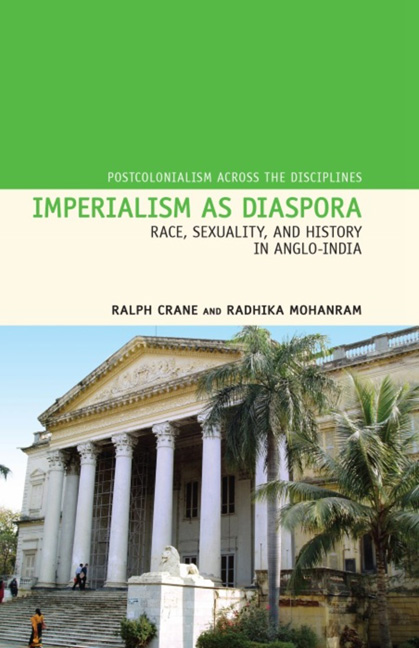Book contents
- Frontmatter
- Contents
- List of Illustrations
- Acknowledgements
- Introduction: Race, Gender, and Diaspora: Explorations of Anglo-India
- 1 Masculinity Forged Under Siege: The Indian Mutiny of 1857
- 2 The Terrains of Identity: Mimicry and the Great Game
- 3 The Missionary's Position: Love and Passion in Anglo-India
- 4 The Laws of Desire: Intimacy and Agency in Anglo-India
- Epilogue: Imperialism as Diaspora
- Bibliography
- Index
Epilogue: Imperialism as Diaspora
- Frontmatter
- Contents
- List of Illustrations
- Acknowledgements
- Introduction: Race, Gender, and Diaspora: Explorations of Anglo-India
- 1 Masculinity Forged Under Siege: The Indian Mutiny of 1857
- 2 The Terrains of Identity: Mimicry and the Great Game
- 3 The Missionary's Position: Love and Passion in Anglo-India
- 4 The Laws of Desire: Intimacy and Agency in Anglo-India
- Epilogue: Imperialism as Diaspora
- Bibliography
- Index
Summary
Diaspora has been an occluded term in the analysis of British imperialism. While British imperialism has fundamentally been read through the lens of power or race, its close relationship to a diasporic sensibility - along with the changes, migrancy, syncreticism, and transculturation that accompanied it - has consistently been ignored. The shifts brought about by diaspora not only affected the imperial subject nation, but also the imperial subject in the nation's diaspora. In Imperialism, Harry Magdoff suggests that fifty-five million Europeans moved to non-European spaces in the century between 1820 and 1920. The British Empire spanned the globe, from Canada to the Caribbean and from Africa and India to Australia and New Zealand. French territories ranged from Africa through to the South Pacific, and the Spanish and Portuguese empires extended through most of the Americas. It was not just European imperialism, but also a European diaspora, or what Alfred Crosby refers to as ‘a Caucasian tsunami’ (5), which overtook the world during the long nineteenth century.
In the years of the operation of the British East India Company, which predated India's formal entry into the Empire, ‘factors’ (agents or representatives), often as young as fifteen, left Britain to work in India, where they might live for the next two or three decades. Having left Britain during their formative years, they became more Indian than British in their attitudes, mores, and sense of aesthetics. Whether or not these young men used the term, India became their ‘home’, and they became Anglo-Indians. Then, in 1911, with a shift in its signification, the term Anglo-Indian was adopted for people of mixed descent with British origins on the patrilineal side. The old Anglo-Indians became British, as if unmarked by their close contact with India and apparently unaffected by their 300-year-old relationship with the subcontinent. In 1947, when India attained Independence, 350,000 people of purely British descent left the country. At the same time, the new Anglo-Indians of mixed descent numbered between 300,000 and 500,000, many of whom, unable to see India as home in the absence of Britain and the British, left for other countries that were still under the yoke of colonialism - Australia, New Zealand, Canada, and South Africa - or for Britain itself. Only about 150,000 mixed-race Anglo-Indians, with their uneasy relationship to the nation-state, remain in India today.
- Type
- Chapter
- Information
- Imperialism as DiasporaRace, Sexuality, and History in Anglo-India, pp. 136 - 138Publisher: Liverpool University PressPrint publication year: 2013



